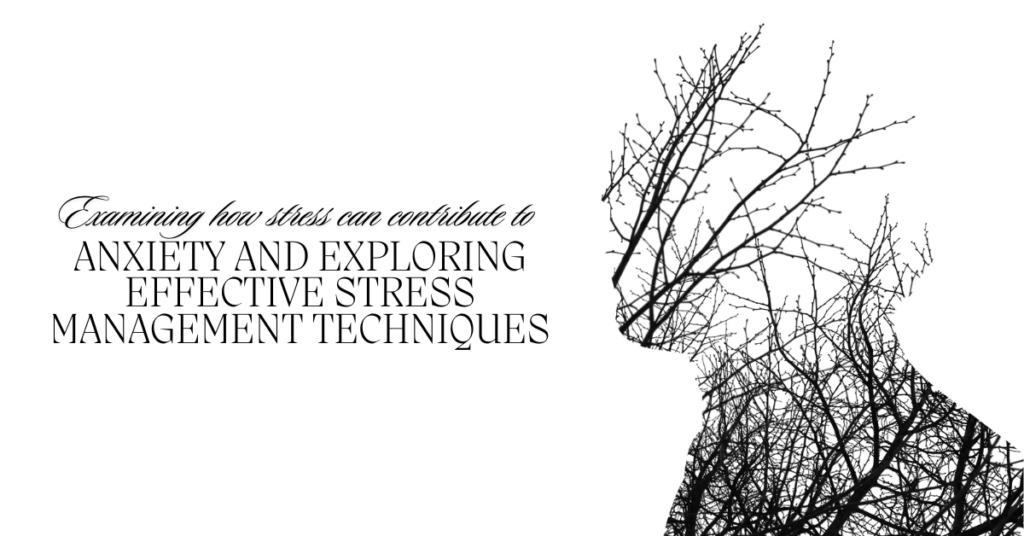
Examining how stress can contribute to anxiety and exploring effective stress management techniques:
Stress. It is a term that permeates contemporary existence. There are impending deadlines, a mountain of work, and uncertainty about the future. While stress can be a normal reaction to life’s challenges on occasion, prolonged stress negatively affects our wellbeing and frequently serves as a precursor to anxiety.
This blog explores the complex relationship between stress and anxiety, showing you how stress exacerbates anxiety and providing you with useful stress-reduction tools to take back control.
Comprehending Anxiety and Stress:
Although the terms stress and anxiety are frequently used interchangeably, they have different qualities. The body’s reaction to a perceived threat or challenge is stress. It triggers the “fight-or-flight” response, releasing hormones like cortisol and adrenaline that prepare us to deal with the situation.
Anxiety, on the other hand, is a more persistent feeling of worry, apprehension, and unease. It can manifest as generalized anxiety, where worry is pervasive, or as specific phobias related to particular situations or objects. While occasional stress can lead to anxiety, chronic stress can exacerbate existing anxiety disorders and even trigger them in individuals who may not have been predisposed.
Anxiety Is Fuelled by Stress:
Persistent stress upsets the body’s equilibrium. High cortisol levels might interfere with sleep cycles, which can make you tired and have trouble focusing. This can therefore exacerbate worry and the pessimistic thought patterns that characterise anxiety. Stress can also deplete neurotransmitters that are essential for mood control, such as GABA and serotonin. Anxiety and even sadness may be exacerbated by this depletion.
The Dangerous Loop:
Anxiety and stress start to interact in a vicious cycle. Anxiety is a reaction to stress, and anxiety makes stress more difficult to manage. Symptoms such as racing thoughts, tense muscles, and trouble falling asleep further impair our capacity to appropriately handle stress. The effects of this cycle on our emotional and physical well-being can be profound.
Practical Stress-Reduction Strategies:
Thankfully, it is possible to stop the pattern and take back control. The following are some practical methods for reducing stress:
Determine Your Stressors: Knowing what sets off your stress reaction is the first step towards managing it. Are there deadlines at work, financial difficulties, or interpersonal problems? Maintaining a stress diary might assist you in recognising trends and typical stressors.
Utilise relaxation techniques: The body’s relaxation response can be activated by methods such as progressive muscle relaxation, deep breathing, and meditation, which counterbalance the “fight-or-flight” response brought on by stress.
Set priorities. Rest: Aim for seven to eight hours of good sleep every night. A sufficient amount of sleep increases resilience, but insufficient sleep exacerbates stress and anxiety. Create a sleep-friendly environment and establish a calming nighttime ritual.
Maintain a Healthy Lifestyle: Regular exercise, a balanced diet rich in fruits, vegetables, and whole grains, and limiting caffeine and alcohol all contribute to stress management. Exercise releases endorphins, natural mood elevators, and improves overall well-being.
Time Management and Organization: Feeling overwhelmed by tasks can be a major stressor. Develop effective time management strategies like creating to-do lists, prioritizing tasks, and setting realistic deadlines.
Learn to Say No: If your plate is already full, don’t be hesitant to set boundaries and turn down new requests. Refusing something saves you time and eases your worry.
Engage with Others: A strong defence against stress is social support. Speak with dependable friends and family, or think about joining a support group for those going through comparable struggles.
Seek Professional Assistance: Don’t be afraid to consult a therapist or counsellor if stress and worry are really interfering with your day-to-day activities. They can offer you helpful support and evidence-based coping strategies.
Using Mindfulness to Reduce Stress:
Techniques for mindfulness, such as attentive breathing and meditation, can be very effective in managing stress. Being mindful entails paying attention to the here and now without passing judgement. This enables you to cultivate calmness and disengage from nervous thoughts and worries.
You can try this easy mindfulness exercise:
1. Look for a peaceful spot where you may sit comfortably.
2. Shut your eyes or bring your attention to a single location.
3. Observe your breathing and note how your chest or abdomen rises and falls with each breath in and out.
4. When your mind wanders (as it inevitably will), gently redirect your attention back to your breath without judgment.
5. Practice for a few minutes each day, gradually increasing the duration as you become more comfortable.
Building Resilience:
Stress management isn’t about eliminating stress entirely. It’s about developing resilience – the ability to bounce back from challenges and adapt to change. By incorporating the techniques mentioned above into your daily life, you can build your resilience and navigate stressful situations with greater ease.
Although stress is an unavoidable aspect of life, you don’t have to let it rule you. You may end the cycle of stress and anxiety and take back control of your health by realising this connection and actively putting stress management practices into practice. Recall that self-care is necessary for stress management and promoting mental and emotional well-being; it is not selfish.



